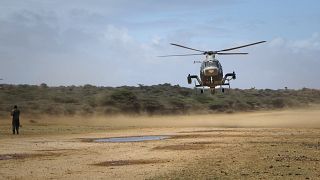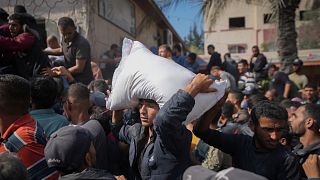International Court of Justice
The International Court of Justice opened hearings on Thursday into South Africa's allegation that Israel has committed genocide against Palestinians in its war with Hamas.
South Africa filed the case against Israel in December, and is asking the United Nations' top court to order an immediate ceasefire in the Gaza Strip.
Israel has denied the claims, with Prime Minister Benyamin Netanyahu saying in a video statement on Wednesday that Israel's military operaiton was "in fulll compliance with international law".
The case has struck at the heart of Israel's national identity as a Jewish state created in the aftermath of the Nazi genocide in the Holocaust.
South Africa's identity is similarly involved, with the country having long compared Israel's policies in Gaza and the West Bank to its own history under the apartheid regime of white minority rule.
Since the latest conflict began on October 7 after a deadly attack by Hamas militants on Israel which killed around 1,200 people, South Africa has remained highly critical of Israel's response in Gaza.
The Israeli offensive has killed more than 23,200 Palestinians in Gaza, about two-thirds of whom are women and childen.
The two days of preliminary hearings began with lawyers for South Africa explaining its case against Israel, which will be followed by a response from Israel's legal team on Friday.
South Africa's allegations focus on the 1948 genocide convention to which both Israel and South Africa are signatories.
While the ICJ's rulings are, in theory, legally binding on parties to the ICJ, they are not enforceable.
Israel, however, has sent a strong legal team to defend its military operation in Gaza.
“I think they have come because they want to be exonerated and think they can successfully resist the accusation of genocide,” says Juliette McIntyre, an expert on international law at the University of South Australia.
It will be a hard case for South Africa to prove in court.
“It’s not simply a matter of killing enormous numbers of people,” McIntyre says. “There must be an intent to destroy a group of people (classified by race or religion for example) in whole or in part, in a particular place.”
In a detailed, 84-page document launching the case, South Africa argued Israel has demonstrated that intent.
In its written filing, South Africa says it wants the court “to establish Israel’s responsibility for violations of the Genocide Convention; to hold it fully accountable under international law for those violations" and to "ensure the urgent and fullest possible protection for Palestinians in Gaza who remain at grave and immediate risk of continuing and further acts of genocide.”
Israel will return to the International Court of Justice's docket next month, when hearings open into a U.N. request for a non-binding advisory opinion on the legality of Israeli policies in the West Bank and east Jerusalem.











Go to video
Egypt FM Abdelatty: Egypt is making "continuous, genuine and non-stop efforts” for ceasefire in Gaza
Go to video
Heavy equipment needed to clear rubble destroyed in Israeli strike on Jabaliya
01:49
For Palestinians in Gaza, the ongoing ceasefire negotiations signify little hope
01:05
Israeli tourists barred from Maldives as act of support for Palestinians
01:02
Pics of the day: April 09, 2025
Go to video
Pics of the day: March 24, 2025